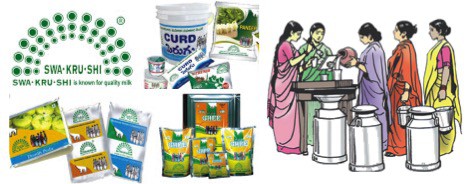Every crisis also provides an opportunity goes the saying. The lockdown announced by the government in March led to a disruption in the supply chain of many of the essential commodities.
However, the experience of dairy cooperatives in ensuring uninterrupted supplies of milk and milk products during the lockdown and during the unlocking phase has been noteworthy. Despite the consumption of milk declining due to the closure of hotels and restaurants during the lockdown period, milk procurement rose because private organised players either scaled down their operations or stopped milk purchases from the farmers.
The lockdown and subsequent phase-wise unlocking of the economy posed some unique challenges for India’s first fully women-owned dairy cooperative — Mulukanoor Women’s Cooperative Dairy (MWCD), which is based in Warangal district of Telangana. Despite several operational issues, the women dairy cooperatives managed to expand their business and outreach during the last six months.
17000 members robust network
Officials of MWCD stated that it was a challenging task to convince family members of more than 17,000 women members of the MWCD to continue supplying milk to the cooperatives at their collection centre especially in the initial weeks of the lockdown.
“As all our members are women, often their husbands and male members in their families did not allow them to bring milk to procurement points because of health concerns. It was a big challenge and we had to conduct an awareness programme along with doctors to convince members about Covid-19 and safety steps,” said Vijaya Gurrala, President of MWCD.
The women-led cooperatives created separate WhatsApp groups for the members, thanks to the gender equality in mobile use among members, who provide milk and employees looking after various aspects such as veterinary services, marketing, procurement and processing wings so that communications took place electronically.
“Thus, there was no need to have physical meetings of various groups. Those employees who were in the field were not allowed to visit processing units,” said Bhaskar Reddy Marpati, General Manager of MWCD.
54000 Litres per day of collection
MWCD which procured around 70,000 litres (yearly average of 54,000 litres) of milk daily currently from its members, also faced challenges as the transporters (who carry milk from procurement points to the processing plant) initially refused to operate their vehicles because of the fear of of the pandemic.
“After discussion, we decided to sanitise all the vehicles bringing milk to the processing plant and we organised awareness creation programmes amongst staff as well as members for ensuring smooth procurement and distribution of milk products,” Gurrala said.
At the village milk collection points, MWCD organised workshops with doctors explaining issues around Covid-19 and the various measures to be taken for ensuring the safety of the staff as well as the members.
Most of the members of WMCD, set up in 2002, are predominantly smallholder dairy producers (with an average herd size of 1-3 animals). The liquid milk and various dairy based products (marketed under the brand name Swakrushi) are supplied to consumers in mainly four districts — Warangal (urban), Jangoan, Siddipet and Karim Nagar.
Excess milk
According to Reddy, the cooperatives received around 5-10 per cent more milk than usual, daily during the April-June, 2020 period as it had procured milk from non-members as well. Sensing a business opportunity, Reddy said that the marketing team of MWCD stepped up their activities to pursue those consumers who were earlier taking loose milk from Dudhwalas to shift to pouch milk.
“It needed some effort as many consumers consider loose milk to be fresh compared with pouch milk,” Marpati said.
The Andhra Pradesh government officials also informed MWCD that milk supplies should not be disrupted during the lockdown as well as after the restrictions were relaxed. As a large section of the population stayed at home, MWCD stepped up their marketing of value-added products like paneer and curd.
Robust financials
The Annual General Body meeting of MWCD which was held on August 1, 2020, also reported sound financial performance during 2019-20. MWCD, which has 191 primary dairy cooperatives, reported a turnover of ₹133 crore for FY20.
The women-owned dairy cooperative has been making the best use of the excess Skimmed Milk Powder (SMP) stocks in the market by buying the powder offered at lower price than the price for milk procured from the members.
“We purchase quality SMP from other markets and even liquid milk where procurement operations have been stalled, at lower prices. We are supplying to those areas where our presence was weak earlier,” Reddy said.
While the milk prices given to members have remained unchanged, MWCD managed to expand their presence through SMP procured at a lower price. The officials of MWCD are quite bullish about posting good financial results in the current financial year (2020-21) as well.
Journey began in 2002
Mulukanoor dairy started its journey in 2002 with 62 primary societies comprising around 5,000 members, and now has a membership of more than 17,500 who supply dairy products regularly (although there are more than 22,000 members).
MWCD, in its initial years, had a tough time marketing its products. It was collectively decided that 10 members from each of the 62 groups would go around Warangal district to promote their dairy products including liquid milk, curd, ghee etc sold through the brand name — Swakrushi.
As data shows, since its formation, MWCD has received both technical and financial support from various institutions such as National Dairy Development Board (NDDB), Access Livelihood Consultancy India and others. The dairy cooperatives have performed well financially which has supported its members through additional income as well as a bonus.
MWCD is one of the best examples of a rural women entrepreneurship model, which needs to be replicated across especially those regions where the presence of cooperatives is marginal.
Written by : The writers Hare krishna Misra and Sandip das are with the Verghese Kurien Centre of Excellence, Institute of Rural Management, Anand, Gujarat. Views expressed are personal.



























